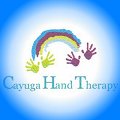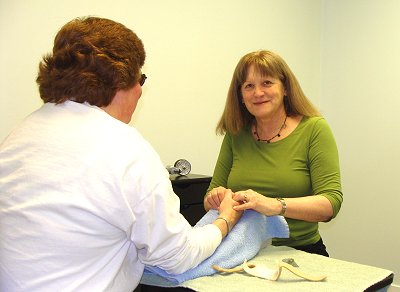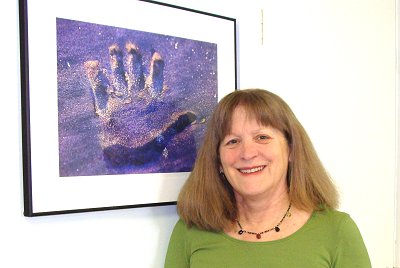- By Dan Veaner
- Business Profiles
 Print
Print  Surgery is only the first step in recovering from an accident or disease that impacts your hands. Physical therapy helps regain the use of your hand and control the associated pain. Susan Michlovitz specializes in physical therapy for hands and upper extremity problems. With a research and academic background, that makes her the go-to therapist in Ithaca for shoulder, elbow, hand, and wrist injuries.
Surgery is only the first step in recovering from an accident or disease that impacts your hands. Physical therapy helps regain the use of your hand and control the associated pain. Susan Michlovitz specializes in physical therapy for hands and upper extremity problems. With a research and academic background, that makes her the go-to therapist in Ithaca for shoulder, elbow, hand, and wrist injuries."Patients express themselves with their hands," she says. "They are very worried when they potentially lose function in their hands. For example, I treat a number of professional musicians, and that can be very scary. It helps if I can provide a calm environment for my patients."
Her practice is Cayuga Hands Therapy located in Community Corners in Cayuga Heights. She creates a calm, professional and friendly environment for patients who may be nervous about regaining the use of their hands after an accident or surgery. Her office is decorated in muted colors with photographs on the wall that she has taken herself. Michlovitz says patients can reasonably expect a fair amount of pain when she sees them a day or two after surgery.
 Working with patient Barb Gegg
Working with patient Barb Gegg"We try to work through that," she says. "We can predict what pain is appropriate or not appropriate to have, and guide and change the dosage of our treatment based on that. I don't believe in 'no pain, no gain.' There is certainly a difference between discomfort during exercises and pain that persists for a long time after the treatment."
For the past six or seven years Michlovitz has incorporated photography and videography to help patients remember the right way to exercise at home. She emails the videos to patients so they can see themselves doing the exercises correctly and duplicate that at home.
"The advantage to that is that they can see their own progress over time," she says. "If they've come in at the beginning with limited motion they can see the progress that they've made a couple of weeks later. I've gotten very good feedback from patients on that. It not only encourages them to keep going, but I know when I go to a physician or a therapist if they give me directions or something that doesn't look like me, I can't always remember it. I walk out of my physician's office and forget what they said."
Michlovitz is originally from Harrisburg, PA. When she was growing up she wanted to be a cowgirl, then a firefighter, and then an attorney. By the time she went to college at Case Western Reserve University in Cleveland she became interested in working with children with disabilities. She thought she would become a special education physical education teacher. But when she took a course that included a rotation in the physical therapy program at a school for physically disabled children, she was hooked. At that time her mother was undergoing physical therapy, and she was fascinated by what she saw the physical therapist doing.
She did her graduate work at the University of Pennsylvania, and began working with children. Later she worked with orthopedic surgeons at a medical school hospital in Philadelphia. Before moving to Ithaca in 2005 she was on the faculty of Temple University in the Doctorate of Physical Therapy and PhD program there. She also had a clinical practice that was affiliated with Temple, where she treated student athletes, among others. She worked in established Ithaca practices at first, then started her own practice.
Now she receives referrals both from local surgeons and others who may treat students at home, but need a good therapist here when they come back to school. She also works closely with hand surgeons in Syracuse who have Ithaca patients. It works the other way as well. She also recommends hand surgeons to patients.
In addition to her practice, Michlovitz remains actively involved on the boards of two professional societies, and in conducting research. She is part of the Hand Therapy Think Tank, a study group which mentors future therapists. She is working with one colleague on developing scales to use in assessing patients for physical measurements, and checking the validity of the measurements. She is working with another therapist to study how patients recover after wrist fractures. She is also part of the Guatemala Healing Hands Foundation trips when they send groups of doctors, nurses, physician assistants, and physical therapists to provide training for local medical professionals and treatment for children.
Michlovitz has taught in universities for decades. She currently teaches part time at McMaster University in Hamilton, Ontario, where her graduate courses in rehabilitation sciences are taught largely online. She also teaches at Columbia University in New York City. In her private practice she stresses education so patients can understand their condition and what they must do to regain their strength and use of their arms and hands. She points out that many patients look up their conditions on Web sites, but much of the information they find is inaccurate. She directs them to qualified medical professional Web sites that have more accurate information.
"Typically those sites have been vetted better than Aunt Mille who broke her leg and is angry with her therapist!" she says.
 Susan Michlovitz
Susan MichlovitzWhen patients come in the first time she collects information from the patient and from information the surgeon has provided. She checks on how surgery has altered a patient's anatomy, and which tissues must be protected. She measures the motion and ability to feel and manipulate with their hands.
"I also have them assess their perception of their disability," she says. "Then together we establish a rehabilitation plan. Typically on the first visit if it's safe for them to move without injuring the structures that have been operated on, I teach them exercises and make a plan to progress their program."
Michlovitz says she likes the flexibility her own practice affords to set her own schedule, pursue other professional activities, to set up a calm environment for herself and her patients, and to allow time for her passion for photography, hiking and travel, going to the Farmers Market, and outdoor theater and art opportunities.
She especially enjoys the patients she has met in Ithaca and helping them with the professional and social challenges they have during their recovery. She says she likes meeting new people all the time and motivating and helping them to use their hands and upper extremities in a better way.
v7i8



